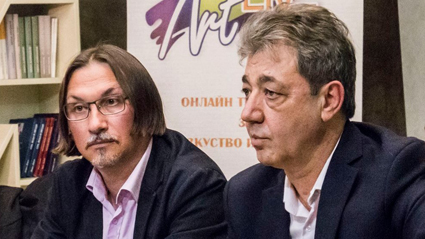The premiere of a new book entitled “Former People according to State Security Classification” brought together hundreds of people who still crave for justice because of the unpunished crimes of communism. The book’s first print run has been sold out for just a week.
"Former people" was a label put on industrialists, clerics, military, politicians, and intellectuals - all persons who contributed to the development of Bulgaria before the coup on September 9th 1944. The communists borrowed the terminology after the nationalization in 1947 from the Stalinist NKVD in order to label people who lost their social and public status after the change of power. On more than 500 pages in his book "Former People," professors Villi Lilkov and Hristo Hristov reveal the scale and ways of repressions imposed on the most capable, the most educated and most virtuous Bulgarians. And although they were successfully isolated from society, the totalitarian power never managed to crush their spirit.
 “The repressions against the so called ‘former people’ continued until November 10, 1989 and included displacements, camps, various administrative and judicial punishments, but the so called justice of the Bulgarian Communist Party was political and not objective,” Hristo Hristov says. “And, of course, the repressions were also transferred to the sons and daughters of these people with the mandatory surveillance. They were oppressed whether they were trying to find a job or trying to enter universities, as many were forbidden to continue their education. Indeed, the invisible repression of State Security did not stop at all during the nearly half-century-long totalitarian regime. And since the party always needed enemies, it turned the so-called ‘former people’, who are holders of the values of the Bulgarian National Revival as its main ideological opponents.”
“The repressions against the so called ‘former people’ continued until November 10, 1989 and included displacements, camps, various administrative and judicial punishments, but the so called justice of the Bulgarian Communist Party was political and not objective,” Hristo Hristov says. “And, of course, the repressions were also transferred to the sons and daughters of these people with the mandatory surveillance. They were oppressed whether they were trying to find a job or trying to enter universities, as many were forbidden to continue their education. Indeed, the invisible repression of State Security did not stop at all during the nearly half-century-long totalitarian regime. And since the party always needed enemies, it turned the so-called ‘former people’, who are holders of the values of the Bulgarian National Revival as its main ideological opponents.”
Bulgaria is the only eastern European country where officials of the former State Stater Security and senior communist party members have become key figures of the transition period and have take control of key positions in business, banking, the judiciary, media, and politics. Even today, State Security agents occupy ministerial posts, sit in parliament, give advice the president… So, it is logical to ask whether there are "former people" today - people for whom some doors are still closed, people marginalized and humiliated, not needed by the new system?
“Sadly, that's true,” Hristo Hristov says. “Not only the so-called ‘former people’ and their families, but all the victims of communism were quickly pushed to the periphery of society. And we are all responsible for having no memory of the totalitarian past, for this ‘organized process of oblivion’, as Professor Evelina Kelbecheva calls it. “In the last few years since Russia occupied Crimea, we see how easily the mistakes of the near history can be repeated,” Christo Hristov says. “It is therefore important for the young generation to know the truth about the totalitarian period, especially when myths are cleverly propagated. Myths such as how good it was back then using brainwashing methods through the Internet and the media. And if society and young people do not know what the price of freedom is, then it can be easily lost.” "Former People" is a book that is good to be present in every Bulgarian home. In order to end once and for all fictitious stories of some elderly people about the “comfort” and “peaceful life” during the times of socialism. Young people must find out about the atrocities committed by the criminal communist regime and keep the mission of protecting freedom in their hearts."
“Freedom is never more than one generation away from extinction,” Ronald Reagan once said.
English: Alexander Markov
Perperikon - the ancient Thracian city near Kardzhali, made it to the top 10 of the world's must-see sites, according to a ranking by the Guardian newspaper. The site is listed alongside Neolithic structures in Spain and France, ancient Roman baths..
This year, the traditional Christmas trip with the Rhodope Narrow Gauge Railway will take place on December 22, Kristian Vaklinov, founder and chairman of the Rhodope Narrow-Gauge Railway Association, told the BNR-Blagoevgrad. Santa Claus and Snow..
The zoo in Stara Zagora has new residents – three female collared peccaries and a male tufted capuchin named Lucho. The animals arrived from the Sofia Zoo under a breeding loan agreement.The practice of zoos exchanging animals for breeding purposes..
The making of knitted products is a traditional craft that deserves a revival and a new life, believes Alexandrina Pandurska, known for her numerous..

+359 2 9336 661
